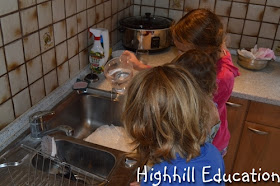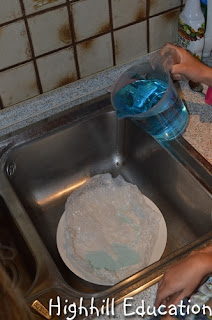Earth Science Unit Study
Week 20: We did an experiment to show how rivers flow when it doesn't rain.Water always flows down hill. On it's way to the ocean water may flow over a water fall, through a canyon, or into a delta. When it rains, much water seeps into the ground where it is stored. If the ground is saturated, after the rain, some water continues to trickle out of the ground and flow into streams. If the ground can hold the water, additional water is not released. That's why sometimes rivers dry up during periods with no rain, but other rivers continue to flow.
We have been using the book Rocks, rivers & the changing earth,: A first book about geology as a reference. It is a chapter book, written in story format, and packed with experiments that have to do with Earth Science. In addition, the book Geography from A to Z: A Picture Glossary (Trophy Picture Books)
To demonstrate how water always flows down hill and how it flows during periods without rain we used a washcloth to represent the ground, a plate to represent the hill, a crumpled up sheet of wax paper so the ground wasn't smooth, some water and a few drops of food coloring.
The wax paper was placed on a plate resting in a tilted position. Water was poured onto the upper end of the plate and the flow of the water was observed.
Here it formed a river.
After adding more water a lake was formed at the base of the river.
The wax paper was repositioned and the experiment was repeated several times. In this version the water formed several waterfalls.
In this photo, the water formed a lake which split in two to reach the sea. - A Delta
Next the washcloth was added to the top of the hill to allow the ground to soak up the water.
When the rain ceased, the rivers continued to flow.

For more educational ideas check out these blog hops.
* I did not receive any compensation for this recommendation. I'm just a homeschooling mom who has found many products that I like. If you're interested in the products I recommend on this blog I want to make it easy for you to find them.
** I am an Amazon associate and receive a small portion of the sales on orders made after clicking in from this site, which I promptly spend on homeschooling books and supplies for my children.









Nice and straightforward! You could add crushed ice at the top too to simulate snow melt from the mountains.
ReplyDeleteI love hands-on experiments like this!
ReplyDelete